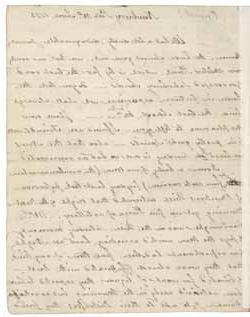Letter from John Bromfield to Jeremiah Powell, 21 June 1775
To order an image, navigate to the full
display and click "request this image"
on the blue toolbar.
-
Choose an alternate description of this item written for these projects:
- Main description
[ This description is from the project: Coming of the American Revolution ]
In this letter to Jeremiah Powell, dated 21 June 1775, John Bromfield describes what he has heard about the Battle of Bunker Hill. Bromfield's information is from friends from Newburyport who served with provincial troops sent to Charlestown. Bromfield describes the conditions in the fortification on the morning of the battle, when men who had spent the previous night building the entrenchment faced shortages of food, water, and reinforcements. Bromfield's letter also describes the first skirmishes between the British and the colonists, many casualties endured by both sides, and ends with the news that Joseph Warren has been killed in battle..
"no refreshment"
In this account written four days after the battle, a man from Newburyport, north of Boston, recounts what he has heard of the events of June 16 and 17 -- beginning with the difficulties of the colonists working to fortify the hill in Charlestown. He passes on to his friend a description of what happens when the provincial forces laboring away realize that British troops are heading right toward them, coming across the water from Boston. He describes the actions that follow and particularly the role of the two Newburyport companies. And he then describes the "greatest loss" of all.
Questions to Consider
1. In his reporting of the Battle of Bunker Hill, what things is Mr. Bromfield uncertain about? Where does he seem to have more details? What might account for what he knows and what he does not know?
2. What examples of heroic and less-than-heroic actions does he cite?
Further Exploration
3. Who was Major Joseph Warren and why was he "universally lamented in the camp"? How does the description of his last action help us to understand how he was viewed by the colonists?

